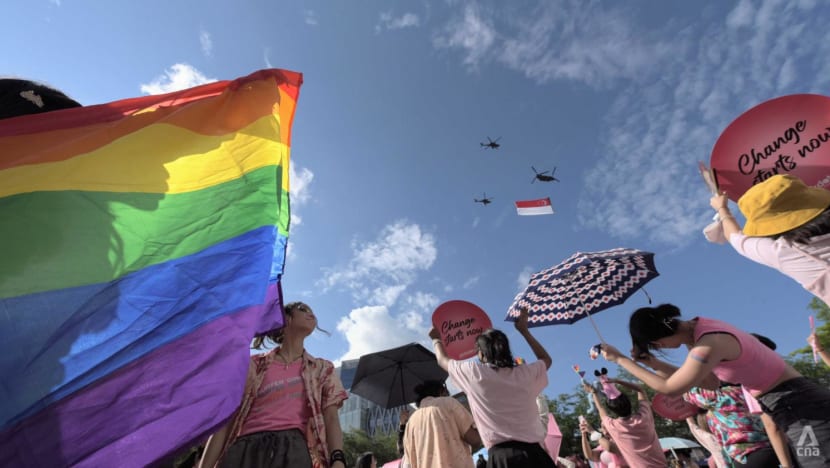Lifestyle
Singapore’s Attitudes Toward Gay Rights Shift Over Past Decade

A recent study by the Institute of Policy Studies (IPS) reveals a significant shift in the attitudes of Singapore residents towards gay sex and marriage over the past decade. Published on August 28, 2024, the study indicates that disapproval of gay sex has decreased by approximately 27 percentage points, while opposition to gay marriage has dropped by around 23 percentage points. Following these changes, just over half of the surveyed population now views gay sex and marriage as wrong, with 52.9 percent and 50.8 percent expressing disapproval, respectively.
The survey, which gathered responses from 4,000 citizens and permanent residents, highlights a broader trend of liberalisation regarding views on same-sex relationships. Attitudes towards gay adoption, surrogacy, and assisted reproductive technology (ART) have also softened, with less than half of respondents opposing these family formation methods.
Changing Perspectives on Same-Sex Issues
The IPS researchers, including Dr. Mathew Mathews, Mr. Hanniel Asher Lim, Dr. Teo Kay Key, and Mr. Melvin Tay, noted that the survey tracked moral attitudes across various religious groups. They found that perspectives on same-sex issues have evolved more than other moral issues addressed in the study. For instance, a strong consensus remains against extramarital sex and gambling, with disapproval rates at 75.1 percent and 74 percent, respectively. Additionally, 58 percent of respondents disapproved of pregnancy outside of marriage, though this figure has also seen a decline of about 15 percentage points.
The researchers identified a hierarchy of acceptance regarding same-sex issues. The highest levels of disapproval were directed at gay sex, followed by gay marriage, and then by gay adoption and ART. Notably, the gap in disapproval between gay marriage and gay adoption narrowed from around 12 percentage points in 2013 to approximately 5 percentage points in 2024. This shift suggests a growing alignment in how respondents evaluate relationship recognition and parenting pathways.
The study further indicates that while acceptance of gay marriage is increasing, it still faces more disapproval than gay adoption or same-sex parenting options. The researchers observed that moral reservations are primarily concentrated on same-sex sexual acts rather than on relationship recognition or parenting.
Generational and Religious Divides
The findings highlight a substantial liberalisation of views on gay sex across most religious traditions from 2013 to 2024. However, notable disapproval remains among older Muslim and Christian respondents. In contrast, younger individuals, particularly those identifying as Catholic, Hindu, Buddhist, or Taoist, as well as the non-religious, exhibited more permissive attitudes toward gay sex.
In August 2022, Singapore announced the repeal of Section 377A, a colonial-era law that criminalised sexual acts between men, while also amending the Constitution to define marriage strictly as a union between a man and a woman. Following this announcement, various religious groups expressed differing views. The Mufti of Singapore referred to the situation as a “tough balancing act,” while the National Council of Churches indicated a willingness to accept the changes. Nevertheless, at least two groups representing over 120 local churches expressed disappointment with the repeal.
In November 2022, legislation was passed to decriminalise gay sex while entrenching the heterosexual definition of marriage in the Constitution. The repeal of Section 377A was welcomed by LGBTQ advocacy groups, marking a pivotal moment in Singapore’s legal landscape.
The IPS researchers emphasized the importance of managing pluralism in multireligious Singapore. They advocate for fostering dialogue on divisive issues while ensuring that strongly held convictions can be expressed without coercion. They assert that religious leaders and the public play crucial roles in navigating these discussions.
“A diverse society is lived, not merely legislated,” the researchers stated, urging citizens to engage in respectful debate and practice the “etiquette of disagreement,” particularly in online settings. This call to action reflects the ongoing evolution of societal attitudes in Singapore and the importance of inclusivity in discussions surrounding LGBTQ rights and recognition.
-

 Business5 months ago
Business5 months agoKenvue Dismisses CEO Thibaut Mongon as Strategic Review Advances
-

 Lifestyle4 months ago
Lifestyle4 months agoHumanism Camp Engages 250 Youths in Summer Fest 2025
-

 Sports4 months ago
Sports4 months agoDe Minaur Triumphs at Washington Open After Thrilling Comeback
-

 Sports5 months ago
Sports5 months agoTupou and Daugunu Join First Nations Squad for Lions Clash
-

 Top Stories5 months ago
Top Stories5 months agoColombian Senator Miguel Uribe Shows Signs of Recovery After Attack
-

 World5 months ago
World5 months agoASEAN Gears Up for Historic Joint Meeting of Foreign and Economic Ministers
-

 Health4 months ago
Health4 months agoNew Study Challenges Assumptions About Aging and Inflammation
-

 Business5 months ago
Business5 months agoOil Prices Surge Following New EU Sanctions on Russia
-

 Entertainment4 months ago
Entertainment4 months agoDetaşe-Sabah Violin Ensemble Captivates at Gabala Music Festival
-

 Entertainment4 months ago
Entertainment4 months agoBaku Metro Extends Hours for Justin Timberlake Concert
-

 Top Stories5 months ago
Top Stories5 months agoRethinking Singapore’s F&B Regulations Amid Business Closures
-

 Business5 months ago
Business5 months agoU.S. House Approves Stablecoin Bill, Sends to Trump for Signature









